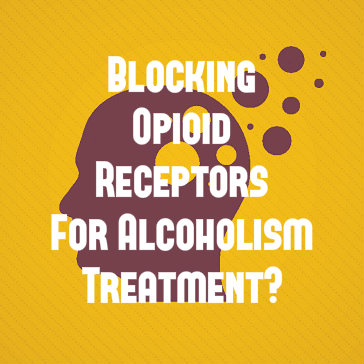Can Blocking Opioid Receptors Yield New Alcoholism Treatment?
Addiction researchers know that alcohol produces some of its effects inside the brain by activating sites called opioid receptors, found on the surfaces of nerve cells. However, they don’t completely understand the brain’s opioid receptor system, and therefore don’t entirely know how activation or deactivation of this system can help or harm a person who drinks excessive amounts of alcohol.
In a study published in May 2014 in the journal Biological Psychiatry, a team of U.S. and Danish researchers explored the alcoholism-related role of one specific part of the brain’s opioid receptor system. The researchers concluded that successful manipulation of this segment of the system could lead to the development of a new family of alcoholism medications.
Alcoholism Symptoms
 Alcoholism is partially defined by a physical dependence, a switch in long-term brain function characterized by a need to regularly consume alcohol in order to feel “normal.” In addition, people with the condition experience symptoms stemming largely from dependence, including recurring urges to keep drinking, an impaired or absent ability to limit drinking participation, increasing tolerance to the impact of any given amount of alcohol intake and the onset of a withdrawal syndrome if the brain’s requirements for alcohol go unmet.
Alcoholism is partially defined by a physical dependence, a switch in long-term brain function characterized by a need to regularly consume alcohol in order to feel “normal.” In addition, people with the condition experience symptoms stemming largely from dependence, including recurring urges to keep drinking, an impaired or absent ability to limit drinking participation, increasing tolerance to the impact of any given amount of alcohol intake and the onset of a withdrawal syndrome if the brain’s requirements for alcohol go unmet.
Alcohol Use Disorder
In any person, the symptoms of physically dependent alcoholism can overlap with the symptoms of non-dependent alcohol abuse. For this reason, current standards in the U.S. ask doctors to diagnose both alcoholism and alcohol abuse as components of a condition called alcohol use disorder.
Alcohol and Opioid Receptors
Opioid receptors get their name because they act as the pathways that allow opioid drugs and medications in the bloodstream to gain access to the brain and spinal cord (central nervous system). There are several types of these receptors on nerve cell surfaces in the brain. For reasons not fully understood by experts in the field, opioid receptors also play a role in giving alcohol access to the brain.
Pharmaceutical researchers have begun to exploit this fact by developing alcoholism medications designed to produce their treatment benefits by occupying the brain’s opioid receptors and thereby blocking alcohol from triggering some of its characteristic effects. One specific medication currently approved in the U.S. for use in alcoholism treatment, called naltrexone (ReVia, Vivitrol), blocks a particular type of opioid receptor and reduces alcohol cravings by diminishing the amount of pleasure derived from alcohol intake.
New Alcoholism Treatments?
In the study published in Biological Psychiatry, researchers from Washington State University and Denmark’s Neuroscience Drug Discovery used laboratory experiments on rats to investigate the role of one specific type of opioid receptor, called the K opioid receptor, in promoting the onset and continuation of alcoholism.
They chose to explore this topic, in part, in response to accumulating evidence that the K opioid receptor helps determine how people react to excessive alcohol intake. In particular, when a person drinks too much alcohol, activation of this receptor may lead to unpleasant emotional states and loss of the ability to feel pleasure. Counterintuitively, this situation may in turn trigger additional drinking as part of a conscious or unconscious attempt to offset the negative feelings associated with alcohol consumption.
During the study, the researchers supplied large amounts of alcohol to a group of rats for an extended period of time, and then allowed those rats to go through alcohol withdrawal. After examining the rats’ brains, they concluded that long-term, excessive alcohol consumption seriously disrupts function in a part of the brain responsible for helping to maintain critical functions, such as the ability to process emotions and make decisions.
While the rats were going through withdrawal, the researchers gave them a number of drugs designed to manipulate their brains’ K opioid receptors. After analyzing the impact of these drugs, they concluded that problems with the K opioid receptors play a significant role in producing the heavy alcohol consumption that people with alcoholism commonly rely on to cancel out alcohol withdrawal symptoms.
The study’s authors believe their findings may be critically important for the development of future medical treatments for alcoholism that produce their benefits by blocking access to the brain’s K opioid receptors. Specifically, they believe that such treatments could help achieve such goals as diminishing the emotional impact of alcohol withdrawal, helping people in recovery establish a stable state of abstinence and helping people in recovery otherwise meet the objectives of their treatment programs.
Learn About Topiramate Treatment For Alcoholism



